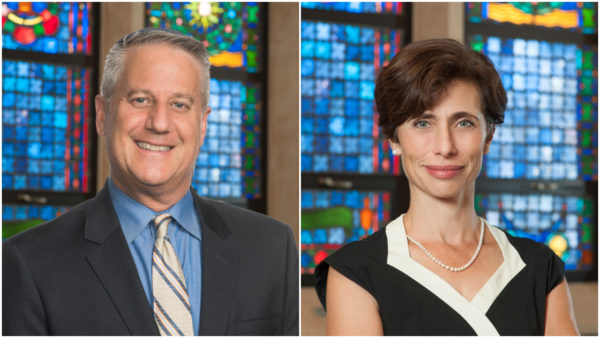Temple Beth-El Senior Rabbis Tara and Meir Feldman announced that they will be moving to Israel next year during the congregation’s annual rabbinic dialogue, held virtually on April 18.
Rabbi Tara Feldman referred to several reasons she and her husband decided to move, including a desire to spend more time with family members and health concerns exacerbated by the coronavirus pandemic. She said that the pandemic made her take time into consideration, on a personal and professional level.
“I hope I have so many more years of great health and tons of energy, but it’s been a moment of asking myself, ‘OK, what are my true priorities, given what time I may have?’” she said on the Zoom call.
Rabbi Tara Feldman called the move one of the hardest decisions of her life, but said her desire to sit and have services with her children and grandchildren in Jerusalem became too great to withstand any longer. She referred to a piece of religious text that translates in English to “know before whom you stand.”
“I feel myself standing with very stark awareness in front of my mortality and knowing the impact of my choices,” she said.
She also said her family’s coronavirus experience up to this point was bookended by two health concerns. Prior to the pandemic going into full effect, she said, she had a “close call” with meningitis that “almost took [her[ life” and was taken to the hospital. Meir Feldman, she said, recently had a heart valve replacement, which kept him away from various services while he was in the hospital as well.
“How do you have an ICU Seder with your husband, while you’re at the dining room table and he’s in a very different situation?” she said. “There’s just an interesting, heightened awareness to all of our shared mortality.”
Rabbi Meir Feldman said that the loss of the ability to show physical affection toward loved ones due to the pandemic’s restrictions is unmeasurable.
“I haven’t really been able to figure out a way to measure the impact of it, but it feels very, very real,” he said.
He said that the past year was one of the most, if not the most, difficult times people have faced in quite some time. He echoed his wife’s point of not being able to see loved ones, friends, as an aspect of the pandemic that has taken a toll on personal and professional levels as well.
“Each of us has our own personal story. Our lists of losses, the fears we’ve been carrying around. Some of us have gone through life-changing experiences,” he said.
Before joining the Temple Beth-El congregation in 2009 with his wife, Meir Feldman was once an associate for a prestigious Wall Street law firm, according to his online biography, and then a federal prosecutor in Los Angeles, with Judaism taking a backseat.
But in his late 30s he took a break from his legal career, participating in Shabbat, reading the works of Jewish philosophers Martin Buber and Abraham Joshua Heschel, his biography said. He then visited Israel with friends and found mentors in David Wolpe and Danny Gordis.
He later attended Hebrew Union College, serve as a Marshall T. Meyer Rabbinic Fellow at the Upper West Side’s B’Nai Jeshurun, and served as an associate rabbi at Temple Israel in Memphis until January 2008.
Rabbi Tara Feldman earned a bachelor’s degree in Russian language and literature from Vassar College and a master’s degree in elementary education from Lesley College, and was ordained by Hebrew Union College in 2001.
She was previously a rabbi educator at Congregation Beth-Elohim in Brooklyn, associate rabbi at Temple Israel in Memphis, Tennessee, and a fellow at Hebrew University’s Melton Senior Educators program in Jerusalem. She also pioneered the idea to bring people together in “micro communities,” temple representatives said, and keep them from disconnecting from society.
Rabbi Tara Feldman described Temple Beth-El and Great Neck as “an irreplaceable, and beautiful community that has been everything we have dreamed of.”
The two signed a 10-year contract with the congregation in late 2017. Efforts to reach officials from the congregation on the status of those contracts and potential successors were unavailing.



